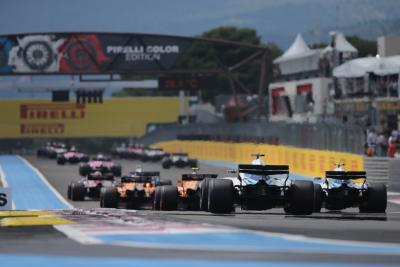Should F1 be leaving the past in the past?
As the child of a historian, I am well versed in the importance of history. Those who don’t know it are doomed to repeat it, and so on.
But sometimes the desire to preserve history leads to stagnation, to holding on to that which no longer fits for the sake of it. Sometimes, history needs to be rewritten and nostalgia ignored in the name of progress.
As the child of a historian, I am well versed in the importance of history. Those who don’t know it are doomed to repeat it, and so on.
But sometimes the desire to preserve history leads to stagnation, to holding on to that which no longer fits for the sake of it. Sometimes, history needs to be rewritten and nostalgia ignored in the name of progress.
This week it was confirmed that Hockenheim would not appear on the 2019 Formula One calendar, as the race organisers still can’t afford to hold the event on an annual basis, and no suitable alternation deal has been found. The possibility of a 2019 German Grand Prix still exists, but it is very remote indeed.
It’s a shame, given that the 2018 F1 grid can boast two German drivers: a four-time world champion and the current record holder for the most grand prix starts without a podium finish. It’s a far cry from the late noughties, when roughly a third of the grid would tear up at the sound of “Deutschland über alles.”
But is the loss of the German Grand Prix a travesty? Given that we were able to lose France - the birthplace of grand prix racing - for an entire decade, are there any circuits or countries that deserve protected status on the F1 calendar?
Die-hard fans would probably point to Britain, France, Italy, Germany, and Monaco as countries that must host races, come what may. My personal list would ring fence both Suzuka and Spa, two very different but very special circuits without which Formula One would not be the same.
But keeping outdated circuits on the calendar out of sentimentality is poor business practice. Hosting an international event is a challenge, and any race that shows itself to no longer be up to the task of putting on a successful grand prix should have its event taken away.
A grand prix must be held on a circuit that meets appropriate safety standards for the speed of a modern F1 car. Thanks to the FIA’s system of circuit grading and homologation, safety standards are a given, and any track that fails to meet its requirements loses its ability to host an event.
Equally important to the success of a grand prix is the pleasure of the experience. Good racing cannot be guaranteed, but tracks that are known for hosting snore-fests on a regular basis should be made to shape up or ship out. There are costs implicit in revising a track layout, but sometimes you have to spend money to make money. Remove a chicane, reprofile a corner or six, and have a racetrack fans will be excited to pay to visit.
The pleasure of the experience extends beyond the confines of the circuit. Fan access is essential, as last week’s calamity at Paul Ricard demonstrated. Anyone who has forked out hard-earned cash to attend a race - and taken time off work, paid for flights and hotels, etc - needs to know that they will be able to attend the race they’ve paid for. The ticket buyer is placing trust in the event host, and event hosts who betray that trust through a lack of adequate planning should be punished accordingly.
For those of us working at a grand prix, access is equally important. Then there are the smaller details that allow for a smooth weekend -- reliable internet access for media to send their words and pictures back to base; basic catering to allow those working beyond restaurant opening hours (ie, all of us…) the opportunity to eat during the weekend; basic power infrastructure to ensure the smooth running of the various audio and video feeds used throughout the track…
In the olden days, the F1 press corps used to award race tracks with two prizes at the end of each season: the Prix Orange, for the circuit that did it best, and the Prix Citron for the one that did it worst. The prizes - issued in jest - no longer exist, but if they did we, would see the ‘heartland’ races sentiment demands we preserve issued with citron after citron after citron.
We can wax lyrical about F1 history all that we like, and we can bemoan the current state of the European economy which means the continent is all but incapable of matching the high standards set by government-funded grands prix in richer territories.
But if a once-great circuit is now only capable of putting on a second-rate event, why should we bother to grace them with our presence?



![Johann Zarco, LCR, Honda RC213V, 2024 San Marino MotoGP, Misano, action [Gold & Goose]](https://cdn.crash.net/styles/thumbnail/s3/2024-09/GnG_1166323_HiRes.jpg?itok=vpgrU7Q4)

![Jack Miller, KTM Factory Racing, KTM RC16, San Marino MotoGP, Misano, action [Gold & Goose]](https://cdn.crash.net/styles/thumbnail/s3/2024-09/GnG_1167624_HiRes.jpg?itok=iz7mA4EQ)


![Fabio Quartararo, Monster Energy Yamaha Racing, Yamaha M1, 2024 MotoGP, Misano Test, action [Gold & Goose]](https://cdn.crash.net/styles/thumbnail/s3/2024-09/GnG_1168928_HiRes.jpg?itok=fcYSole_)
![Toprak Razgatlioglu, ROKiT BMW Motorrad, BMW M 1000 RR, Magny-Cours, WorldSBK [Gold & Goose]](https://cdn.crash.net/styles/thumbnail/s3/2024-09/GnG_1165133_HiRes.jpg?itok=GD5SVNVG)

